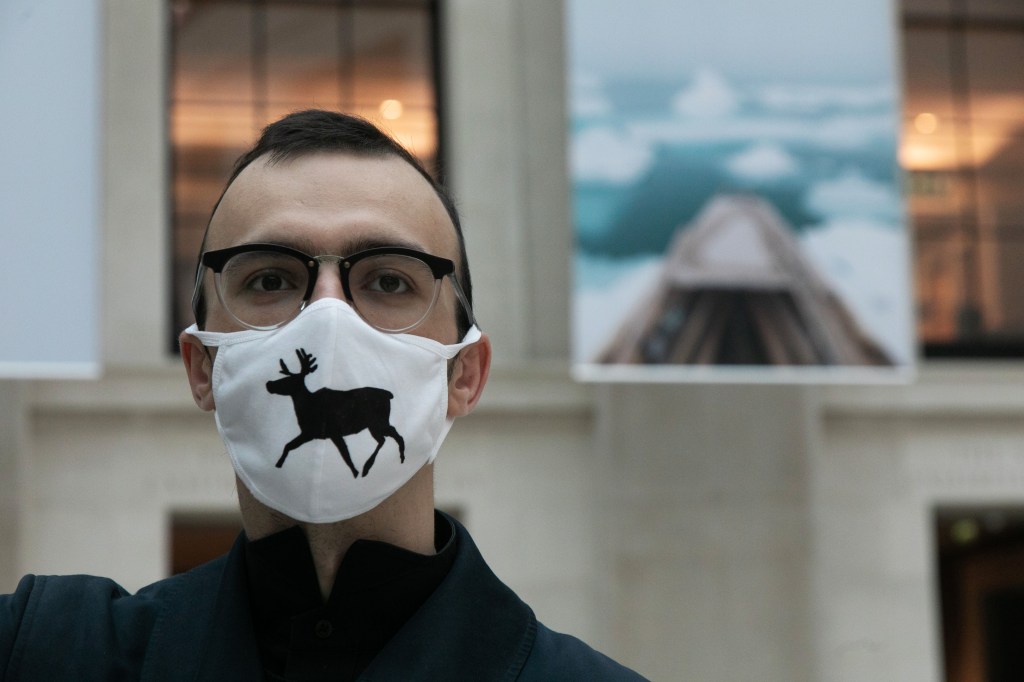This morning, we returned to the British Museum’s Great Court where we held a protest in solidarity with Indigenous Arctic communities whose sacred lands are under immediate threat from oil drilling. It was part of a day of action called by Gwich’in and Iñupiaq-led Indigenous groups in Alaska, against the Trump administration’s push to open up the Arctic National Wildlife Refuge for oil exploration. It will be one of 16 banner drops taking place across the US and Alaska over the course of the day, amplifying the message ‘Sacred lands are not for sale. Stop Arctic oil extraction!’
Read our briefing ‘Stop Arctic oil extraction!: how the British Museum’s Arctic exhibition is at odds with its partnerships with major polluters’ for more background on why we took this action.

Photo by Kristian Buus.
Once inside the museum, we unfurled three banners, the central one designed by Alaskan Indigenous organisations Defend the Sacred AK and Native Movement, who have co-ordinated the day of action. We also unveiled two smaller banners either side, which shone a spotlight on the museum’s partnerships with fossil fuel firms and their financial backers:
- The museum’s long-running partner BP was the biggest operator in the Alaskan Arctic for 60 years, producing over 13 billion barrels of oil
- The sponsor of the Arctic exhibition, US bank Citi, is the world’s third biggest funder of fossil fuels, and backer of many pipeline and drilling projects actively opposed by Indigenous communities

Photo by Kristian Buus.
Our protest coincided with the official press preview of the museum’s latest exhibition, Arctic: culture and climate, exploring the impact of climate change on Indigenous peoples in the Arctic. It opens to the public tomorrow, Thursday 22nd October.
Siqiñiq Maupin, Community Organizer for Native Movement and Sovereign Iñupiat for a Living Arctic (SILA) has said:
“The attack on Alaska as a whole has been overwhelming. Our food, water, and air has been contaminated to the point of serious health impacts to humans and our relatives on the land and in the sea, We are seeing warming of the land that sustains all life at two times the rate of the rest of the world, endangering basic needs as the climate crisis worsens. In the midst of a pandemic that disproportionately affects BIPOC communities, we must take a stance against any further fossil fuel extraction and continued harm against our People. We are experiencing a shift in global consciousness from a system rooted in white supremacy into systems rooted in Indigenous ways and values. We must transition into an equitable and sustainable future for all beings.”
Our protest consisted of a small, socially-distanced group of us holding the three large banners in silence. Protests are exempt from “tier 2 rules” in England as long as the organisers complete a risk assessment – which we did – and offered to share it in advance with the museum.

Photo by Kristian Buus. Banner design by Jessi Thornton, Native Movement.
Sarah Horne from BP or not BP? said:
‘Today we are standing in solidarity with Indigenous communities in the Arctic who are pushing back against fossil fuel extraction and demanding climate justice. We’ve come to the British Museum because, while its new exhibition rightly puts Indigenous people’s perspectives on climate change front and centre, it continues to partner with those that helped create the climate emergency. The Arctic exhibition is sponsored by Citi, a bank that is the third biggest funder of fossil fuels in the world. Meanwhile, the museum continues to partner with oil giant BP, which first started drilling in the Arctic 60 years ago. There is a clear disconnect between the words and the actions of the museum and it’s time that was addressed.”
For more information about the campaign against drilling in the Arctic National Wildlife Refuge, BP’s 60-year history of drilling in the Arctic and Citi’s ongoing investments in fossil fuels, read our briefing ‘Stop Arctic oil extraction!: how the British Museum’s Arctic exhibition is at odds with its partnerships with major polluters’.
Over the last two years, many cultural institutions have cut their ties to oil sponsorship. Last October, the Royal Shakespeare Company dropped BP as a sponsor mid-contract and, just days later, the National Theatre declared a climate emergency and announced the end of its partnership with oil giant Shell. In March, the Southbank Centre and British Film Institute confirmed that their corporate memberships with Shell would also not be renewed, and in May the National Portrait Gallery revealed it had dropped BP as a judge of the BP Portrait Award following protests from artists last year.

Photo by Kristian Buus.
Meanwhile, the British Museum has seen a major escalation in the campaign against its BP sponsorship deal with BP or not BP? organising a mass creative protest in February involving 1500 people, bringing a Trojan Horse into the museum’s courtyard and 50 activists staying overnight in the museum’s Great Court – all without permission. The decision on whether to renew BP’s sponsorship of the museum will be taken in 2021. While the Covid-19 pandemic has made the financial situation for cultural organisations more precarious, the urgency of climate change and the need for all organisations to act on it has also intensified.

Photo by Kristian Buus.